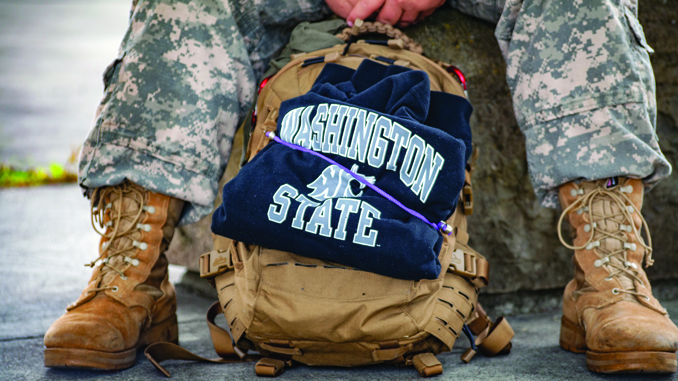According to Veterans Coordinator, Krista Griffin, there are 265 veterans in attendance at Washington State University Vancouver, making up seven percent of the student population. On average, 50-60 veterans graduate every year. These graduates wear a red, white and blue tassel on their graduation cap.
As the Veterans Coordinator, Krista Griffin is the primary point of contact for veterans on campus. “I meet with students prior to them applying to WSU and assist them through the admissions process,” she explained. “Once they are enrolled in classes I help them understand their VA benefits and report their enrollment to VA so they receive their benefits. I am also an advisor they can come to during their time as a student to get advice on benefits, academics, or whatever challenges they may be experiencing.”
Along with Griffin, there are other resources on the WSUV campus to support veterans such as priority enrollment, veterans specific orientation, tuition waivers, utilization of the veterans center, mentors, veteran’s club and the annual Veterans Day celebrations.
Psychology major and Army veteran Chelsea Clarkson works as a peer mentor for veterans on campus. In her position, Clarkson has the opportunity to assist other veterans on campus. “Mentoring entails being a guide to help transfer vets into student life on campus,” she explained. “It also helps the transition go smoothly and allows me to fix any issues they may encounter.”
Mark Fangonilo, another veteran on campus, is currently majoring in electrical engineering. After serving in the Army for eight and a half years, Fangonilo says he chose the WSU Vancouver campus because it is local and he found the new electrical engineering program intriguing.
“It was hard to change the mindset of active duty to being in the student, work environment.”
— Army veteran Mark Fangonilo
As an Army veteran, Fangonilo spoke of the challenges of transitioning to civilian life, from a structural standpoint. “It was hard to change the mindset of active duty to being in the student, work environment,” he explained. “Things get more ambiguous. You get used to being told everything in the military and once you’re out, no one is there to direct you anymore. You’re on your own.”
Fangonilo is not alone in his transitioning challenges. Eric Battison, a senior studying biology, expressed some of the challenges he has faced since returning home to civilian life.
“Language and mentality is drastically different,” explained Battison. “The ability to make jokes in an irreverent observation are impossible. You have to worry about social backlash. It’s hard to have a student perspective, because the average student grows up, goes to college, etc, but the same age vet who is 21 has come back from Afghanistan or Iraq and has a different perspective on life.”
Veterans obtain a variety of jobs while in the service, ranging from clerical jobs to combat. While serving, men and women are told how to eat, think and breathe so often that when they rejoin civilian life many struggle keeping up with the flow of society.

“Higher education is very different than the military,” says Veterans Coordinator Krista Griffin. “College is fairly unstructured in comparison—professors aren’t making sure you go to class. You schedule your own time to do homework and take care of other responsibilities. Students are encouraged to think outside the box, be creative and are very autonomous. It can be culture shock for veterans who are transitioning into college.”
Veterans occupy many different facets on campus, but many non-veteran students can find it difficult to relate to veterans, claiming they are too “intimidating” or “unapproachable.” Though some students claim to feel this way, not all agree.
Alexis Christin, a senior english major, agreed with some student interpretations of veterans, but quickly added that she is unfazed by veterans due to growing up with family in the military.
Christin described how misinterpretations of veterans on campus make her feel.“When I hear people say vets are unapproachable, it makes me feel like they aren’t making the effort to get to know them. I like to go up to them and say thank you for your service.”
Whether it be saying thank you or simply understanding that veterans have lived a different reality in comparison to traditional students, Veterans Coordinator Krista Griffin encourages students to reach out. “Veterans often feel more comfortable around other people who have served in the military, but that doesn’t mean they aren’t open to meeting new people.”
For more information about veterans affairs, please visit Krista Griffin in the Student Services Center, room 113 or contact her at 360-546-9570, krista.griffin@wsu.edu

